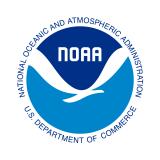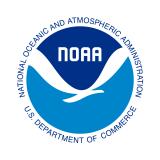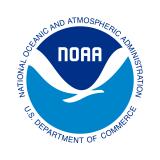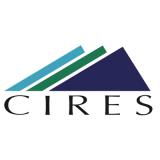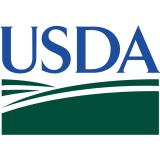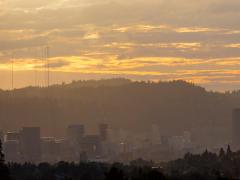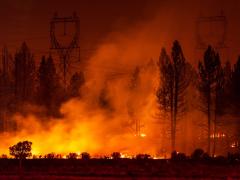NIDIS and Partners to Chair Sessions on Drought at 104th AMS Annual Meeting
The American Meteorological Society is hosting its 104th annual meeting on January 28–February 1, 2024, in Baltimore, Maryland. This year, the meeting will focus on the theme, "Living in a Changing Environment."
The National Integrated Drought Information System (NIDIS) is excited to co-chair sessions during the 38th Conference on Hydrology on Advancements in Analysis and Prediction of Drought. One of these sessions will likely be featured as a Presidential Session.
Other drought-focused AMS sessions will cover topics such as flash drought monitoring, predictability, and impacts in a changing climate, as well as tools and products for real-time monitoring of the climate.
The call for abstracts is now open, and abstract submissions for most sessions are due by August 31, 2023.
Explore select drought-related sessions below, or view all conference sessions on the AMS website.
Advancements in Analysis and Prediction of Drought
38th Conference on Hydrology
Session Chairs: Molly Woloszyn, NOAA/NIDIS, Cooperative Institute for Research in Environmental Sciences (CIRES); Joshua Roundy, University of Kansas; Maya Robinson, NOAA; and Jason A. Otkin, Cooperative Institute for Meteorological Satellite Studies (CIMSS), University of Wisconsin - Madison
This session requests submissions on topics including, but not limited, to “current drought prediction science and skills at various lead times; advances in our understanding of the causes and characteristics of drought and impacts of land-atmosphere interactions, data analyses and numerical modeling; innovative management uses of drought science; and case studies illustrating advances in understanding, monitoring and prediction of drought and drought impacts. Further, papers identifying and/or addressing gaps and deficiencies in our current methods for predicting droughts and estimating its effects on vegetation, water and energy resources, environmental security, and the health and food security of human populations are also invited.”
Flash Drought Monitoring, Predictability, and Impacts in a Changing Climate
38th Conference on Hydrology
Session Chairs: Andrew Hoell, NOAA/Physical Sciences Laboratory; Mike Hobbins, NOAA/Physical Sciences Laboratory, CIRES; Hailan Wang, NOAA/Climate Prediction Center; Jason A. Otkin, CMISS, University of Wisconsin – Madison; Jordan I. Christian, School of Meteorology, University of Oklahoma
This session invites submissions that “advance our ability to monitor, understand, and predict the complex interactions between terrestrial, atmospheric, and oceanic processes that can be used to anticipate the effects and improve early warning of flash droughts in our changing climate. We also invite submissions that further our understanding of anthropogenic effects on flash drought and our understanding of the linkages between flash drought and impacts on energy, food, health, and water security."
Tools and Products for Real-Time Monitoring of the Climate
28th Conference on Applied Climatology
This session will be "an opportunity for climate service providers to showcase their monitoring products that are delivering up-to-date climate information to broad audiences. ... As we continue to experience the effects of a changing climate, it is becoming increasingly important to monitor these changes as they’re happening. There are a plethora of climate monitoring products that are publicly available. Examples of federally produced tools include NOAA’s Climate at a Glance and the National Weather Service’s Advanced Hydrologic Prediction Service (AHPS). Federal and academic partnerships have resulted in the production of products such as WestWide Drought Tracker from the Western Regional Climate Center and GrassCast from the USDA and National Drought Mitigation Center. State Climate Offices also provide suites of real-time monitoring products, including the Oklahoma Mesonet and CoCoRaHS Condition Monitoring from the Colorado Climate Center."
Applications of Artificial Intelligence for Improved Estimation and Prediction of Extreme Precipitation and/or Drought in Weather and Climate
23rd Conference on Artificial Intelligence for Environmental Science
This session invites submissions “leveraging AI tools to improve understanding and/or forecasting abilities of extreme rainfall and drought events.”
The Multifaceted Role of Evapotranspiration: Impacts on Ecosystems, Agriculture, Drought Monitoring, and Climate
38th Conference on Hydrology
Session Chairs: Kyle R. Knipper, USDA Agricultural Research Service; Nicolas E. Bambach, University of California Davis; Martha C. Anderson, USDA Agricultural Research Service; William Kustas, Hydrology & Remote Sensing Lab, USDA; and Yun Yang, Mississippi State University
This session is seeking submissions “related to novel approaches focusing on [the evapotranspiration, or ET] field to remote sensing monitoring and modeling. We encourage interdisciplinary ET studies aiming to explain, mitigate, and/or prevent disruptions or changes in ecosystems, agriculture, drought, or climate.”


